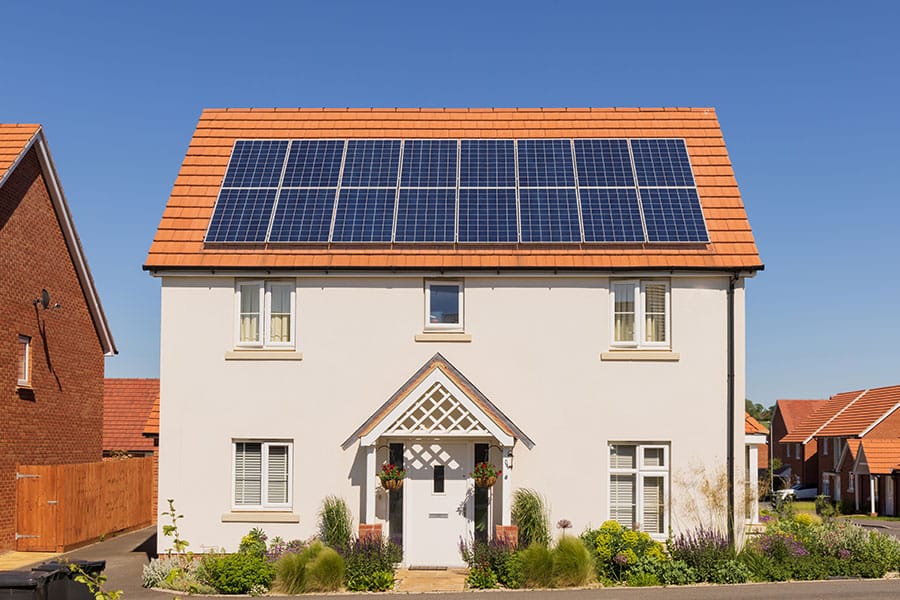Understanding how many solar panels are needed to power a typical house can help homeowners make informed decisions about investing in solar energy. Several factors come into play, including household energy consumption, panel efficiency, and roof space. This guide will help you estimate the number of panels required and outline important considerations for your solar journey.
Factors That Determine How Many Solar Panels You Need
- Household Energy Consumption
- The average UK home consumes about 3,800 kWh of electricity annually. Your specific energy needs may vary based on the number of occupants, home size, and energy usage habits. To find your home’s annual consumption, check your electricity bills or consult with your energy provider.
- Solar Panel Output
- Solar panels typically produce between 400 to 500 watts of power each. The total number of panels required depends on the wattage output of the chosen panels. For example, if you choose 500-watt panels, you would need fewer panels compared to using 400-watt panels to generate the same amount of energy.
- System Size
- The size of the solar PV system needed is typically measured in kilowatts (kW). For an average household, a 3.5 to 4.5 kW system is sufficient to cover a significant portion of electricity usage.
- Calculation Example: If you need a 4 kW system and choose 400-watt panels, you would divide the total system size by the panel wattage:
- 4,000 watts ÷ 400 watts/panel ≈ 10 panels
- This means approximately 10 panels are needed.
- Roof Space Availability
- The available roof space will determine how many panels you can install. Standard solar panels measure around 1.75 m x 1.2 m and require approximately 2.1 square meters per panel, including spacing. Ensure that your roof can accommodate the necessary number of panels without obstruction from chimneys, dormers, or shading from trees.
- Panel Efficiency
- The efficiency of solar panels impacts how much electricity they generate. Higher-efficiency panels may cost more but will produce more power per square meter. This allows you to install fewer panels to meet your energy needs. Monocrystalline panels are typically more efficient than polycrystalline panels.
How to Estimate the Number of Solar Panels for Your Home
- Calculate Your Energy Needs:
- Determine your annual energy consumption in kilowatt-hours (kWh). You can find this information on your utility bill.
- Determine System Size:
- To cover most or all of your electricity usage, calculate the system size you need by dividing your annual kWh usage by 1,000 (to convert to kW) and then by the number of sunlight hours your location receives annually (usually around 3.5 to 4 hours/day in the UK).
- Choose Panel Wattage:
- Decide on the wattage of the solar panels you want to use. Common panel wattages range from 400 to 500 watts.
- Estimate Number of Panels:
- Use the following formula:
- Total panels needed = Total system size (in watts) ÷ Panel wattage
- Example for a 4 kW system using 400-watt panels:
- 4,000 watts ÷ 350 watts/panel ≈ 10 panels
- Use the following formula:
Key Considerations for Solar Panel Installation
- Roof Orientation and Tilt:
- South-facing roofs are ideal for maximum sunlight exposure. East- and west-facing roofs can still produce good results but may require more panels to achieve the same output.
- Shading and Obstructions:
- Shading from nearby buildings, trees, or roof structures can affect panel efficiency. Opt for a site assessment to ensure optimal placement.
- Inverter and Battery Storage:
- Choosing a compatible inverter and adding battery storage can enhance energy use by storing excess energy for later use. Brands like Tesla Powerwall, SolarEdge, and GivEnergy offer reliable storage solutions that complement your solar system.
Conclusion
The number of solar panels needed to power a typical house in the UK usually ranges between 10 to 15 panels, depending on energy usage, panel efficiency, and roof space. For the best results, consult with a professional solar provider like REF Electrics to get a personalised assessment and quote for your home.Contact REF Electrics Today for expert guidance and a tailored solar panel installation plan to meet your energy needs and make the most of your investment in renewable energy.
